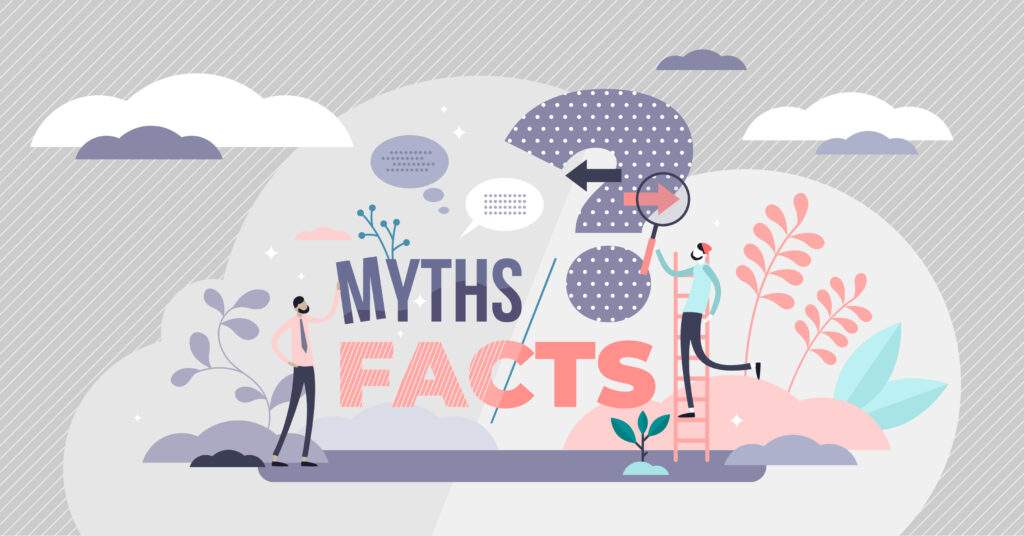Discussion about SaaS among business leaders, consultants, vendors, and tech writers is a healthy practice. It helps drive innovation and informs best practices. But it also creates a lot of noise. And where ERP software is concerned, there’s plenty of discussion (and noise) out there.

Due to the growing number of ERP solutions, especially as they increasingly serve the needs of SMBs, it no longer makes sense to draw broad conclusions about them.
But the myths still exist. So we revisited some of the most prominent misconceptions about ERP software to see why they shouldn’t carry the weight that they used to.
Here are our top 5 ERP myths (busted, for your convenience).
ERP Software Systems Cost Too Much
Plenty of single-service software providers will tell you that the cost of an ERP system is too high to justify adoption. When they do, they’ll point to some of the largest products on the market, whose adopting companies have thousands of users. The price tag for a solution like that may reflect the needs of extremely large enterprise companies.
But ERP has changed. It’s not just for enterprises anymore: SMBs can use cloud enterprise software to manage the same processes on a smaller scale than the types (and complexities) of business it was originally built for.

Price tag aside, the Aberdeen Group reports that “owners of SMBs prefer using ERP systems instead of standalone solutions because it can reduce operation costs by 11%.”
The proliferation of cloud software has resulted in many ERP software systems, all with different pricing models. Many of them are suited for small to midsize businesses. And cloud solutions are even more affordable. According to an article in CFO, cloud ERP systems are cheaper than on-premise solutions by 30% on average.
It’s worth looking around at the pricing of different ERP solutions. You’ll probably be surprised at the affordability.
ERP Software is Too Complicated
It makes sense that software as dynamic and feature-heavy as ERP seems like it could be too complicated for an SMB. However, that perception is the result of looking at an all-in-one solution and comparing it to a single-service product.
If you’re a small-to-midsize business owner, here’s a great way to test how complicated ERP software is: forget about ERP for a moment. Now, tally up all of the software products you use.
Each product— whether you’re using it to manage accounting, sales, customers, inventory, projects, employees, or documents— has its own interface with its own characteristics. It would be impossible, for example, to train all employees on multiple software products at the same time.
More importantly, those separate software applications don’t natively connect. Each one produces a different data set. That means you’re either doing a lot of file exporting/importing, manual entry, or you’re using integrations that don’t always work after a software update.
Now let’s get back to ERP software. With ERP, you get one system to manage all of your business processes. In fact, the Aberdeen Group reports that ERP Software has helped small business owners to standardize back-office processes by 77%.
No matter what core features you use, the look and feel are the same. The ticketing system is the same. The document sharing hub and work calendar are the same.
And because that standardization exists, you can train every single employee on ERP software at the same time. Cloud ERP even allows you to train your remote workers in real-time.
ERP Software Can’t Be Customized

The idea that ERP software can’t be customized comes from the outdated perception that ERP systems lock your company into doing things to fit the software, not the other way around.
Today’s cloud ERP software is much more agile. Not only can processes be customized, the best products out there even offer complimentary customization services.
Customization, by nature, should be handled on a case-by-case basis. A conversation with a software vendor will reveal how flexible the product will be.
Make sure that, when you see a software demo, you’re proactive enough to explain the ways you’d like to do things. Your software advisor should be able to configure the system to reflect your needs. If they can’t, it’s probably time to look elsewhere.
Vendors approach customization differently— and some are more limited than others. It’s worth noting, too, that plenty of single-solution software products can also be limited in their customizable options. Ultimately, it’s up to you to match your desired level of customization to what the product offers.
ERP Software Doesn’t Offer Enough Support
Every software vendor makes a decision about what methods and levels of support they want to provide. And while easy access to support resources is crucial for great customer experiences, support is only ever as good as the people on the team.
If you want support service that answers the phone, email, or chat immediately, you’ll need to choose a vendor who prioritizes responsiveness.
Responsive support is not the priority of all software vendors. But some understand the true value of helping customers achieve their business goals. Great support is more than a practice— it’s a philosophy.
If you’re unsure about the type of support you’ll get with an ERP software, hear what other customers have to say about it. If people are complaining about any product’s support, chances are that you’ll know. Visit their social media channels and you’ll be able to see their reputation for customer support very quickly.
ERP Software Negatively Impacts Productivity

A 2016 report from the Aberdeen Group found that small businesses experienced a 36% reduction in the time it takes to make decisions because of ERP software.
There are plenty of good reasons for that. Among them, ERP software reports on company-wide data. Because cloud ERP is fully integrated, it doesn’t have to pull from multiple data sources. Instead, it is the data source.
Couple that with the efficiency that comes from having a standardized back office, and you begin to realize that ERP software significantly increases productivity.
Because it connects your entire company, ERP offers productivity tools that are unmatched by any one or multi-function software on the market.
Productivity shouldn’t be compartmentalized; companies benefit when all employees, in all divisions, can be more productive.
Conclusion
There are plenty of myths about ERP software out there. And some of them have been well-earned. As with any software product that has shifted to a more agile, cloud-based model, ERP systems have had some growing up to do.
And grow up they have. What was once meant only for true enterprise companies is now possible for businesses of all sizes. ERP solutions aren’t just viable options for SMBs— they’re increasingly essential to businesses who want to see value in both process and company culture.

